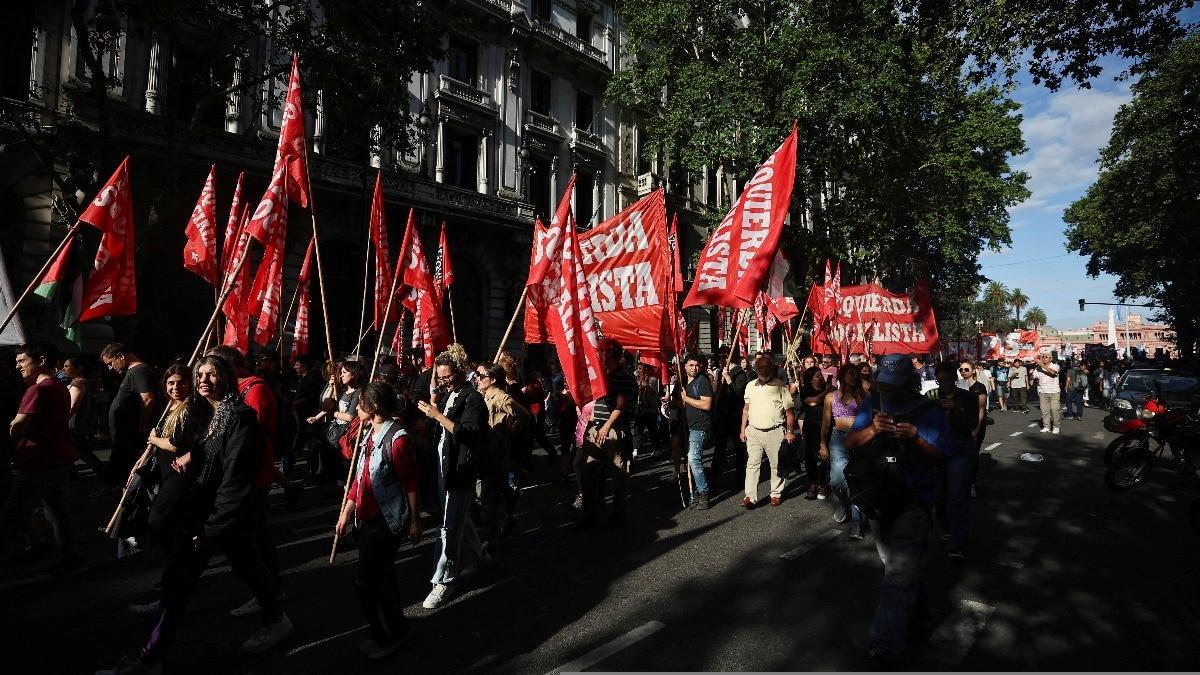
Workers’ unions in Argentina are mobilizing again for the first time in weeks and taking to the streets. Teachers went on strike at a national level yesterday to demand a pay raise in line with inflation, and journalists at the national broadcaster TELAM protested as President Milei announced the closure of the entire outlet, resulting in over 750 job losses.
The two mobilizations marked the beginning of several sectoral struggles, which unions say is the start of a move towards a general strike against Milei’s ‘shock therapy’ austerity plans in the coming weeks. The metalworkers’ union has proposed a set of rolling general strikes, starting with a one-day stoppage, escalating to a 3-day strike across all unions.
Argentina’s economy is sliding further into unprecedented levels of crisis as annual inflation hit 254%, the highest anywhere in the world.
Milei’s policy of removing all price and exchange rate controls and cutting subsidies has led to massive devaluation and price hikes.
Days after taking office, Milei devalued the Argentine peso by more than 50 percent, and already sky-high inflation rates ascended even further. Since then, the cost of gas in Argentina has roughly doubled. Food prices have risen by roughly 50 percent, according to official government data. Health care costs have increased at a similar clip. Around the two-month mark of Milei’s presidency, Argentina’s annual inflation rate topped 250 percent, surpassing that of Venezuela (which is under extreme Western sanctions) to become the highest in Latin America.
As the price hikes intensified, Milei slashed subsidies for services ranging from transportation to utilities, honoring his campaign pledge to take a metaphorical “chainsaw” to public spending. The move put even more pressure on Argentines’ pocketbooks.
On the campaign trail, Milei suggested abolishing Argentina’s central bank and dollarizing its economy, outlandish proposals that raised eyebrows among observers. But in office, his strategy has so far been more conventional: a fiscal adjustment plan designed to reverse longstanding government deficits through budget cuts and tax hikes. The president has described his austerity package as “shock therapy.”
For the society, Milei’s austerity has been devastating. Salaries and pensions have not come close to keeping up with inflation. Workers’ purchasing power fell by roughly 14 percent month-over-month at the end of 2023, a contraction not seen in decades. Demand for food at soup kitchens is surging. A study released earlier this month from the Catholic University of Argentina estimates that the country’s poverty rate surpassed 57 percent in January. According to the same group of researchers, 49.5 percent of Argentines lived in poverty in December 2023, when Milei took over. At the end of 2022, 43.1 percent were considered poor.
Sebastián Menescaldi, an economist and the director of the Buenos Aires-based EcoGo consultancy, forecasts that the most painful period of Milei’s economic shock is yet to come. Starting this month, utility price hikes will combine with back-to-school costs to wallop families’ bottom lines. (In Argentina, summer breaks run from Christmas through February.) In March and beyond, “people will feel like they are drowning,” Menescaldi said.